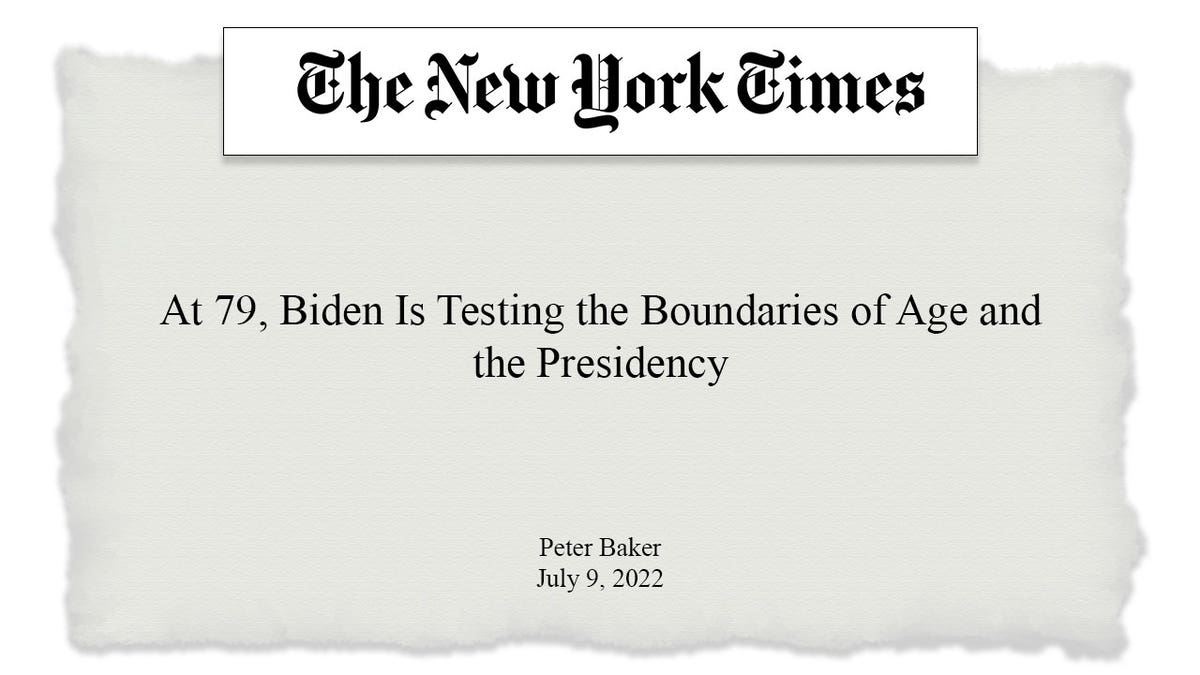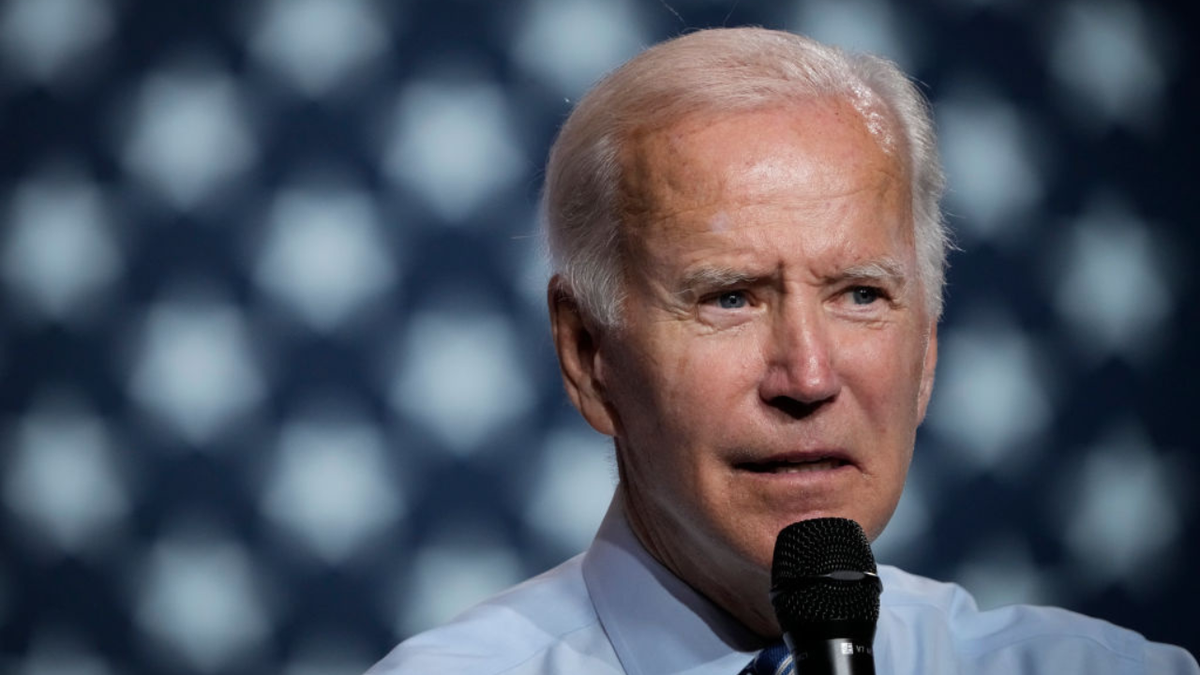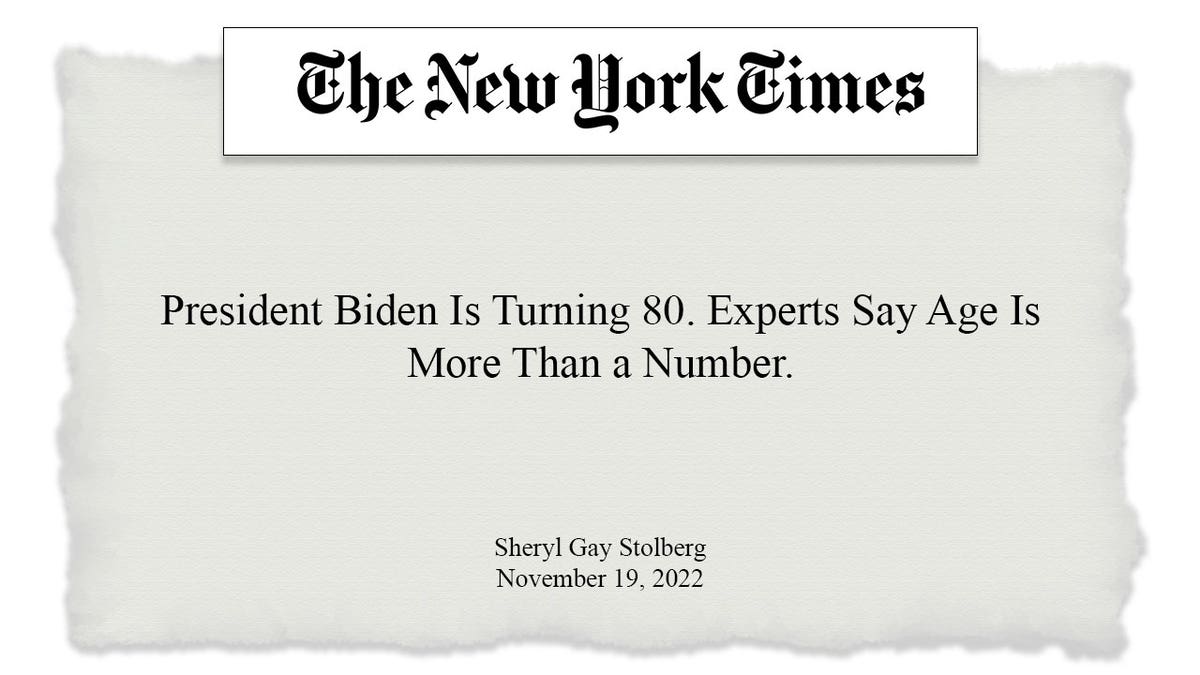NY Times slammed for 'proactive gaslighting' on Biden's age
The 'Outnumbered' panel responds to the New York Times' defense of Biden's cognitive abilities as he celebrates his 80th birthday in office.
The New York Times underwent a jarring pivot in its coverage of President Biden's age, which continues to draw scrutiny as the 2024 election cycle steadily approaches.
Biden has repeatedly asserted that he "intends" to seek reelection, leaving some Democrats concerned about his ability to run vigorously as an octogenarian after largely campaigning from the sidelines in 2020 due to the pandemic.
In July, the Times ran a report titled "At 79, Biden Is Testing the Boundaries of Age and the Presidency," sounding the alarm that his age "has become an uncomfortable issue for him and his party."
The report began by highlighting how his then-upcoming trip to the Middle East was initially tacked onto his recent trip to Europe with one anonymous official calling it "crazy" if the president had done a 10-day trip overseas, those aides tell the Times there were "political and diplomatic" reasons behind separating the trip into two.
"But the reality is that managing the schedule of the oldest president in American history presents distinct challenges," Times chief White House correspondent Peter Baker wrote at the time. "And as Mr. Biden insists he plans to run for a second term, his age has increasingly become an uncomfortable issue for him, his team and his party."

The New York Times published a stunning report in July about concerns over President Biden's health as he looks towards a 2024 run. (Fox News Digital)
Baker recapped from President Biden's European trip how he needed guidance from another world leader to look at the cameras for a photo-op and how outgoing British Prime Minister Boris Johnson answered a question on behalf of the president, who didn't hear a reporter shouting a question about Ukraine.
"At times, Mr. Biden kept a packed schedule. On the day he flew to Madrid for a NATO summit, he met with multiple leaders and finished with a dinner hosted by King Felipe VI and Queen Letizia of Spain. On another day, though, he skipped evening festivities with other leaders, and his public schedule finished with a 3:30 p.m. event," Baker wrote. "But aides said he was busy and stayed up working late each night of the trip out of view — just as they say they expect him to in the coming week as he hits the road again in Israel and Saudi Arabia."
Baker wrote that Biden's age has become "a sensitive topic in the West Wing," noting that he is already one year older than President Reagan was when he finished his second term. He alleged "more than a dozen current and former senior officials and advisers uniformly reported that Mr. Biden remained intellectually engaged, asking smart questions at meetings, grilling aides on points of dispute, calling them late at night, picking out that weak point on Page 14 of a memo and rewriting speeches like his abortion statement on Friday right up until the last minute."
However, the Times acknowledged that Biden's energy level is "not what it was" and that some aides "quietly watch out for him."
"He often shuffles when he walks, and aides worry he will trip on a wire. He stumbles over words during public events, and they hold their breath to see if he makes it to the end without a gaffe," Baker detailed. "Although White House officials insist they make no special accommodations the way Reagan’s team did, privately they try to guard Mr. Biden’s weekends in Delaware as much as possible. He is generally a five- or five-and-a-half-day-a-week president, although there are times when he is called at any hour regardless of the day. He stays out of public view at night and has taken part in fewer than half as many news conferences or interviews as recent predecessors."
The White House was irked by the amount of media attention Biden's fall off his bicycle received in June despite his regular workout routine and that his "admirers" still question his ability to lead for another six years if reelected in 2024.

President Biden falls to the ground after riding up to members of the public during a bike ride in Rehoboth Beach, Delaware, June 18, 2022. (Reuters/Elizabeth Frantz)
David Gergen, a former White House adviser for four presidents who turned 80 in May, told the Times he feels it's "inappropriate" to seek the presidency beyond 80 years old, insisting he wouldn't trust himself to run any organization since "you’re not quite as sharp as you once were."
But "longevity specialist" S. Jay Olshansky of the University of Illinois Chicago said "there’s no evidence that the age of Biden should matter one ounce" but said the "right question" is whether the president's mental fitness will reach to 86, the age he'd be at the end of a second term, telling the Times, "Things go wrong as we get older and the risks rise the older we get."
JOE BIDEN CELEBRATES 80TH BIRTHDAY AFTER NAOMI BIDEN'S WHITE HOUSE WEDDING
After citing a June poll showing 64% of voters say Biden is too old to be president, Baker wrote that Biden's public appearances "fuel that perception."
"His speeches can be flat and listless. He sometimes loses his train of thought, has trouble summoning names or appears momentarily confused. More than once, he has promoted Vice President Kamala Harris, calling her ‘President Harris,'" Baker told readers. "Mr. Biden, who overcame a childhood stutter, stumbles over words like 'kleptocracy.' He has said Iranian when he meant Ukrainian and several times called Senator Mark Warner, Democrat of Virginia, ‘John,’ confusing him with the late Republican senator of that name from Virginia."
He also pointed to various moments the White House had to walk back Biden's comments like when he vowed that the U.S. would militarily respond if China invaded Taiwan and when he declared Russian President Vladimir Putin "cannot remain in power."

U.S. President Joe Biden speaks during a rally hosted by the Democratic National Committee (DNC) at Richard Montgomery High School on August 25, 2022 in Rockville, Maryland. (Drew Angerer/Getty Images)
However, a report from the same paper published on Saturday, the day before Biden's 80th birthday, offered a stark reversal about how the president's age should be covered.
"While the risk of life-threatening diseases, dementia and death rises faster with each passing decade of a person’s life, experts in geriatrics say that people in their 80s who are active, engaged and have a sense of purpose can remain productive and healthy — and that wisdom and experience are important factors to consider," Times correspondent Sheryl Gay Stolberg wrote.
BIDEN WHITE HOUSE SLAMMED BY LIBERAL JOURNALISTS FOR DENYING ACCESS TO WEDDING, CALLED LIARS
Stolberg told readers that she spoke with "10 experts in aging" who have not examined or treated the president but provided analysis based on publicly available information and his most recent medical report.
"Mr. Biden, these experts agreed, has a lot going in his favor," Stolberg wrote. "He is highly educated, has plenty of social interaction, a stimulating job that requires a lot of thinking, is married and has a strong family network — all factors that, studies show, are protective against dementia and conducive to healthy aging. He does not smoke or drink alcohol and, according to the White House, he exercises five times a week. He also has top-notch medical care."
The report suggested that despite Biden's infamous gaffes and mental lapses, some of his brain function "can even improve" regardless of his age because of how active he is, something experts refer to as "neuroplasticity of aging."

The New York Times ran a report shrugging off President Biden's age ahead of his 80th birthday. (Fox News Digital)
Stolberg even cited Duke University professor and psychiatric epidemiologist Dr. Dan Blazer to downplay Biden's "verbal stumble" when he called for a dead congresswoman at a White House event, apparently forgetting she had died in a car crash weeks prior.
"Slippage of memory is something that is usual, but it is not a real deficit," Blazer told the Times. "They forget, they remember they have forgotten and they eventually remember what they have forgotten."
The Times later listed octogenarians who've served in public life in recent years, including the late 87-year-old Supreme Court Justice Ruth Bader Ginsburg as well as "seven U.S. senators" including Bernie Sanders and Mitch McConnell but noted Dianne Feinstein is "obviously diminished at 89; she struggles to recall the names of colleagues and what happened in meetings."
CLICK HERE TO GET THE FOX NEWS APP
"While experts are reluctant to diagnose Mr. Biden from afar — and there is no way to predict the future — those who have reviewed the available White House medical records said that so far, he appears to be aging in a healthy way," Stolberg wrote.
The report quoted University of Illinois Chicago epidemiologist Dr. Jay Olshansky, who says both Biden and former President Trump likely fall into the category of "super-agers," which is a "subgroup of people that maintain their mental and physical functioning and tend to live longer than the average person their age."
Stolberg concluded by asking Dr. Nir Barzilai of the Institute for Aging Research at the Albert Einstein College of Medicine whether age should be a factor in any election, to which Barzilai replied, "Age is not something to consider on its own."

